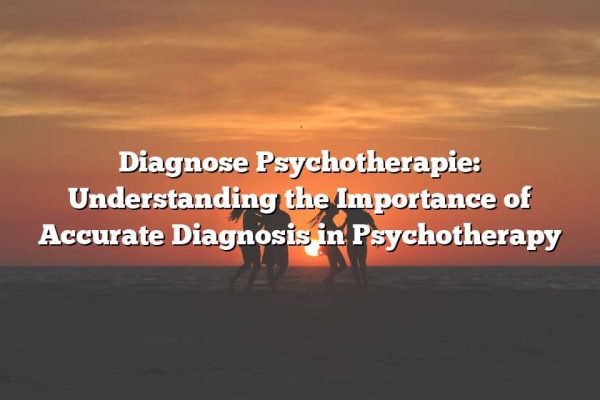In the field of psychotherapy, accurate diagnosis is crucial to providing effective treatment. The process of diagnosing a patient involves understanding their symptoms, experiences, and behaviors to identify underlying mental health conditions. It allows clinicians to develop targeted treatment plans that address the specific challenges faced by each patient. In this article, we will explore the importance of accurate diagnosis in psychotherapy and the role it plays in ensuring successful outcomes.
Understanding Diagnostic Criteria
The first step in diagnosing a patient is understanding the diagnostic criteria for mental health disorders. The Diagnostic and Statistical Manual of Mental Disorders (DSM) is the standard classification guide used by mental health professionals in the United States. It provides a list of symptoms and criteria for each mental disorder, along with guidelines for proper diagnosis.
The DSM is regularly updated to reflect new research and understanding of mental health conditions. It currently lists over 400 different disorders, including depression, anxiety, bipolar disorder, and schizophrenia. Each disorder has a unique set of symptoms and diagnostic criteria that must be met for an accurate diagnosis.
The Importance of Accurate Diagnosis
Accurate diagnosis is crucial to providing effective psychotherapy. If a patient is misdiagnosed or diagnosed with the wrong disorder, the treatment plan may be ineffective or even harmful. For example, treating a patient for depression when they actually have bipolar disorder may exacerbate their symptoms and lead to a worsening of their condition.
Accurate diagnosis also helps therapists develop targeted treatment plans that address the specific challenges faced by each patient. For example, a patient with PTSD may require different treatment strategies than a patient with generalized anxiety disorder. Accurate diagnosis ensures that each patient receives personalized care tailored to their individual needs.
The Challenges of Accurate Diagnosis
Accurate diagnosis in psychotherapy can be challenging for several reasons. The symptoms of different mental health disorders can overlap and present in varying degrees of severity. Patients may also be hesitant to disclose their symptoms or experiences, making it difficult for clinicians to develop an accurate diagnosis.
Additionally, mental health professionals may have different interpretations of the DSM criteria or may rely on subjective observations when diagnosing patients. This can lead to inconsistencies in diagnoses and treatment plans.
To address these challenges, mental health professionals must stay up-to-date on the latest research and diagnostic criteria for mental health disorders. They must also strive to create an open and trusting environment with their patients, where patients feel comfortable sharing their experiences and symptoms.
The Role of Psychotherapy in Diagnosis
Psychotherapy plays an essential role in the diagnosis of mental health disorders. During therapy sessions, clinicians can observe and assess the patient’s symptoms and behaviors, which can aid in making an accurate diagnosis. They can also ask targeted questions to elicit more information about the patient’s experiences and establish a rapport that encourages open and honest communication.
Additionally, psychotherapy can help patients develop insights into their symptoms and experiences, which can aid in the diagnostic process. By discussing their feelings, thoughts, and behaviors with a qualified mental health professional, patients can gain a better understanding of their mental health and work towards a more accurate diagnosis.
Conclusion
Accurate diagnosis is a crucial component of effective psychotherapy. It ensures that patients receive personalized care tailored to their individual needs and helps therapists develop targeted treatment plans. While accurate diagnosis can be challenging, mental health professionals must remain vigilant in staying up-to-date on the latest research and diagnostic criteria. By doing so, they can help their patients achieve successful outcomes and live a happier, healthier life.

